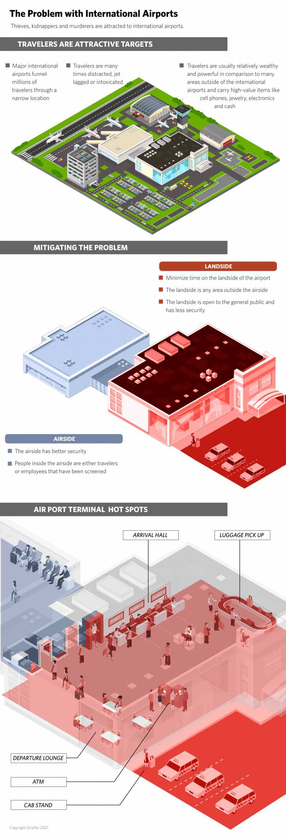Espionage Threats
In most countries, the relationship between border security operations and intelligence agencies is close for national security reasons, but missions can easily drift toward economic espionage when the opportunity arises — especially in countries that pose a critical espionage threat. International airports are border entry points and typically host large contingents of security personnel responsible for processing and documenting individuals entering the country. There is a huge intelligence value in tracking who is entering or leaving a country, and any kind of physical surveillance operation against foreign visitors tends to begin and end at an international airport. Business travelers may receive extra attention at an airport in the guise of VIP service but, especially in high-risk industrial espionage countries, escorts and minders may also fill an intelligence role by providing physical monitoring of an intelligence target the moment he or she steps off the plane. There is also a counterintelligence value to monitoring passengers at international airports, as foreign spies tend to follow the same patterns as, and blend in with, other passengers. Since spies have been known to operate under the cover of business and commercial activity, legitimate business travelers may experience increased scrutiny in an effort to root out intelligence threats.
In addition to documenting individuals as they arrive, border checkpoints at airports also allow authorities to check belongings, including electronic devices. Governments can, and often do, compel travelers crossing their borders to provide password access to digital devices without probable cause to do so. Noncompliance can mean being denied entry into a country, quickly ending any planned trip and forcing you to pay for an early return home. While authoritarian states may make more aggressive demands, this is true in some form for nearly every country, including Western democracies like the United States. U.S. Customs and Border Protection reported that during fiscal year 2020, it conducted 32,038 searches of electronic devices. This only represents a fraction of a percent of total international travelers for that year; other national agencies that do not report such figures likely have a much higher rate of searching electronic devices.
While searching devices certainly raises privacy concerns, even more concerning is the seizure of devices for unobserved inspection — usually a risk reserved for the process known as "secondary screening" which tends to impact a fraction of international travelers, but can leave someone in limbo for hours. During secondary screening, agents of a foreign state often have unrestricted access to belongings and personal devices with little to no transparency into what they are doing. Any electronic device that comes out of secondary screening is liable to have been copied or worse, carrying malware that could report back to authorities and potentially allow them to access broader proprietary networks. Encryption is seldom a viable defense since authorities can threaten to reject anyone who does not provide the relevant credentials, including encryption keys, to allow them to search a device. For this reason, it is prudent to leave sensitive, personal information and devices at home — especially when you travel to countries where the espionage threat is high. Instead, bring sanitized devices that only have the bare minimum connection back home. If such devices go through secondary screening, assume that they have the capacity to track your activities and turn them over to an IT security professional after your trip for assessment.
Protest Threats
Airports' strategic importance to the international movement of goods and people means that interrupting those services in the form of protest attracts the attention of authorities and the public to a given cause. Labor strikes at airports are common. Airline employees in Europe routinely use the busy holiday travel seasons to leverage their disruption against management. Climate activists and other social justice movements have regularly targeted airports or even highway approaches to airports in major cities as a force multiplier, as just a few people can delay airport operations or disrupt traffic to and from terminals. Such disruptions provide mass media exposure to activist causes and embarrass local officials responsible for keeping strategic transportation infrastructure open and operating.
June/July 2021: Ongoing labor strikes over proposed wage cuts for airport workers have targeted Paris' Charles de Gaulle and Orly international airports, causing disruptions to access roads and the use of tear gas in an international terminal.
October 2019: A lone Extinction Rebellion activist delayed flights at London City Airport when he climbed on top of a British Airways plane in order to draw attention to climate change. He and other climate activists had previously disrupted flights at Heathrow International Airport by operating drones in restricted areas.
August 2019: Two months into a Hong Kong pro-democracy protest campaign against the local government, protesters surged to the international airport, where they clashed with police, detained at least one arriving traveler, and disrupted thousands of passenger and cargo flights.
Emerging Cyber Threats
Given airports' strategic importance and popularity among virtually every threat actor, it is only a matter of time before a state-backed, criminal or hacktivist cyberattack shuts down operations at a major airport or airline. In recent years hackers have targeted airports in places such as Iran and Vietnam to replace travel information on screens with propaganda against the countries' governments. While such acts have little operational impact, they do indicate that hackers see airports as attractive targets and have access to airport systems that could mature with time to facilitate attacks against airport operations. Aside from ideological motivations, criminal threats persist and appear to be growing. In 2019, flight information boards at Cleveland Hopkins International Airport went down following a criminally motivated ransomware attack. Even more recently, the European Air Traffic Management Computer Emergency Response Team reported that the general increase in cyberattacks from 2019 to 2020 attributed to the COVID-19 pandemic similarly impacted the aviation sector. In Europe, airlines reported 775 cyberattacks, almost all of which were financially motivated and about half of which led to financial losses. Given the trend in 2021 of increasingly disruptive ransomware attacks by well-organized groups and the increasing reliance on airports and airlines as travel resumes, travelers should expect hostile cyber activity to disrupt travel in the near future.
Mitigating the Risks of Air Travel
Mitigating the array of risks at airports requires minimizing time on the landside of the airport and having a plan (and contingency plans) for getting to and from the airport. International travel can be hectic, and processes at airports vary by country and city. Being prepared before you arrive and giving yourself plenty of time will minimize distractions and allow you to focus on your immediate surroundings. Even once past the security layer, travelers should continue to use caution, especially when it comes to logging onto Wi-Fi to finish up work or shop online.
Airport security, especially in the West, is geared toward preventing major attacks, not necessarily stopping petty theft or cybercrimes. For those who have a high public profile or who are traveling with valuables, planning is even more necessary. Do not make yourself more visible than necessary, which might mean blending in with a sedan rather than traveling in a flashier vehicle more likely to attract the attention of criminals, protesters or other threat actors. Use discretion when purchasing and traveling with high-value items, such as electronics, jewelry or currency. Anticipating threats in advance and continuing to monitor them throughout a trip ultimately helps travelers lower their risk of being targeted.
Preflight Security Precautions:
Travelers should minimize the amount of time they spend outside secure areas during arrival and departure. Extremist and criminal attacks are more likely to affect passengers on the less secure, landside of an airport, but the more secure airside of an airport sees far fewer attacks.
Prearrange airport pickups or drop-offs with a trusted provider rather than trying to negotiate ground transport upon arrival in a new country. Transport to and from airports commonly involves scams or even the threat of violent robbery.
Do not travel with sensitive physical or electronic files that could be vulnerable to searches and compromise at border entry points when traveling to countries where the espionage threat is high. Bring sanitized backup devices to support communications and work rather than personal or business-issued devices.
Monitor ongoing political, social or labor unrest at your destination that could affect transfers to and from airports or even air travel itself.
Avoid using Wi-Fi networks, even supposedly authorized ones, at airports. Instead, use your phone's data and tether it to other devices via a physical cable to avoid network snooping. If absolutely necessary to connect to Wi-Fi, do not enter login credentials or other sensitive information and disconnect as soon as possible.

How to get your free month
How pricing works
How to view posts
What you can post
A #podcast about #persuasion, #deception, #communication, and the #Grayman
https://promocards.byspotify.com/share/5e3dfefd944d823be992a43447470e279711b635
These are some of my favorite camping tips A #podcast about #preparedness, #camping, #hiking, and the #Grayman
https://spotifyanchor-web.app.link/e/umedj5kJiBb














